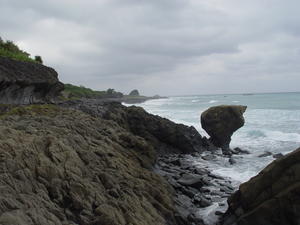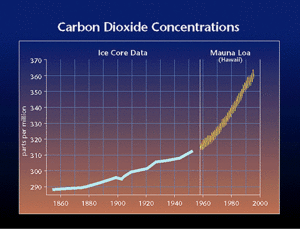Global Warming
The changes in sea level can leave evidences to coastal area, such as sea notches, marine terraces, Haulien, Taiwan
Image Credit: C. H. Jen, 2004
Changing atmospheric concentration of carbon dioxide from 19th century to 2000
Image Credit: clinton4.nara.gov/media/gif/Figure4.gif
In 1985 scientists attending a conference on climate change in Villach, Australia announced that due the concentration of Green House Gases, it is now believed that in the first- half of the this century, a rise in global mean temperature could occur which is greater than any in man’s history. They predicted a rise in global temperatures of 1.5-4.5°C. Although there is consensus that global climate change will occur, the nature of climate change at the regional level is not yet well understood.
Recent analysis indicates that the earth as a whole has warmed by about 0.3-0.6°C over the past century. It is expected that this rate will increase significantly to 0.5–1.0°C per decade through the next few decades, if human activities, which emit green house gases, continue unabated. The warming will not be globally uniform but will differ significantly between geographical regions. In addition, the warming may vary between seasons. As a result, the altered temperature gradients will change the pattern of winds and precipitation distribution regionally. The details of these localised changes are not clearly understood. It is expected, however, that the interiors of continents will shift displacing current patterns of agricultural production.
The observed global temperature records, including ocean and land readings, reveal a warming trend during this century of a magnitude within the range predicted by models. Furthermore, the latter half of last century registered the warmest temperatures on record.
Global warming can induce unpredictable changes of our living environments. Melting glaciers and precipitation are causing some rivers to overflow, while evaporation is emptying others. Diseases are spreading. Some crops grow faster while others see yields slashed by disease and drought. Strong hurricanes are becoming more frequent and destructive. Arctic sea ice is melting faster every year, and there are growing fears of a shutdown of the ocean currents that keep Europe warm for its latitude, as reflected in the scientific fiction movie “the day after tomorrow”. Clashes over dwindling water resources. Warming can induce thermal expansion of the oceans, combined with melting ice on land, is raising sea levels. In this century, human activity could trigger an irreversible melting of the Greenland ice sheet and Antarctic glaciers. This would condemn the world to a rise in sea level of six metres - enough to flood land occupied by billions of people, destroy the most beautiful landscapes and cities in the world. More information on global warming, http://www.nrdc.org/globalWarming/f101.asp.
 Stop and Think!
Stop and Think!
Where do you live? Will the rising sea level affect your local area?

